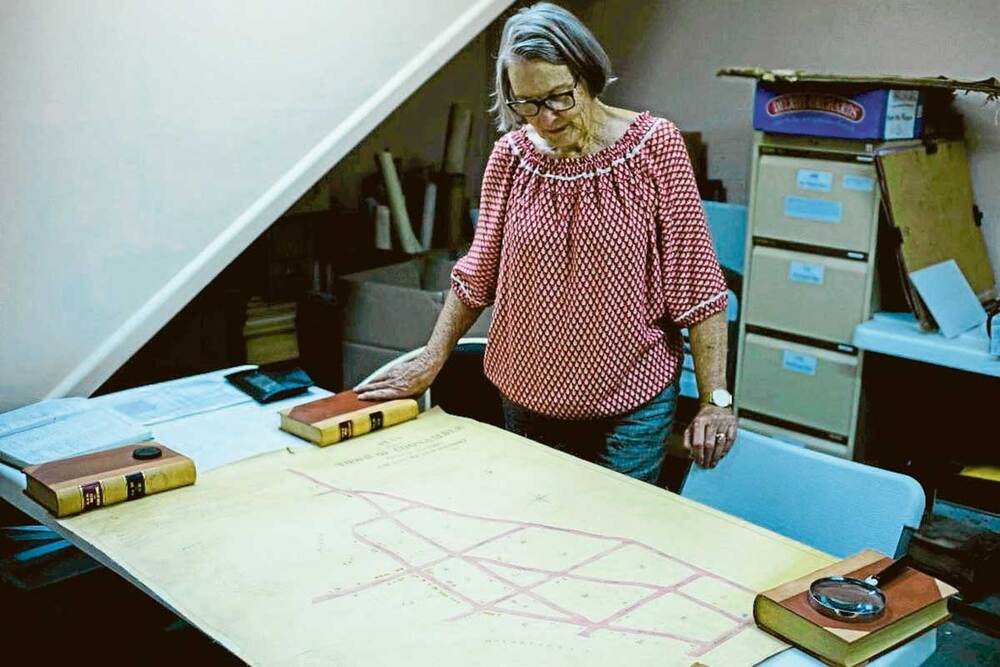Back to work in the archives
Coonamble Times
19 April 2024, 7:40 AM
 Visiting friend and history professor Carol Liston with Pauline Ditchfield in the Coonamble Archives.
Visiting friend and history professor Carol Liston with Pauline Ditchfield in the Coonamble Archives.Surrounded by old documents in the District Archives directly under Coonamble’s Council Chamber, longtime friends Pauline Ditchfield and retired university history teacher Adjunct Associate Professor Carol Liston have been busy sifting through the town’s past.
With much of the district's heritage lost to floods, fires, relocations and demolitions, the underground construction of the town's archives beneath the shire chambers when the building was extended and remodelled in that late 1980s, means important documents are offered maximum security and kept according to best archival practice.
It is the management of the 'paperwork' that is an ongoing challenge for a small group of local volunteers and visiting helpers.
“It’s bit of a detective job working out what things are,” Dr Liston said. “You just don’t know each time you open [documents]. That’s part of the excitement.”
Work began Tuesday 2 April to open, register and catalogue items shedding a light on life in the area over a century ago.
“For example, this one here,” Dr Liston said, holding a plastic sleeve of receipts, “they’ve been partly rat eaten or destroyed, but they’re from 1895, which are the earliest years that Coonamble existed.”
“There’s people selling sheep and carting goods for Dalgety and Co. [stock agency at the time].”
“It’s a bit of a mix. We found the first layout of the streets and what buildings were on them before the [1929] fire.
“One of the ones we were just going through was for a business that we worked out was the barber shop, hairdresser, the tobacconist and the billiards room.
“If you went to have your hair cut, you’d just put it on the account because you didn’t have a credit card or you didn’t have cash.
“These are the people who’d had a haircut, bought some tobacco for their pipe and then others who’d gone in to have a game [of billiards].
“So, they’ve put them on the account because they’re only small amounts and then they’d get an account from the shopkeeper each month to pay up.
“These ledgers of small purchases in themselves reflect commercial trust within the community.”
“These records, when someone’s got the time to look at them properly, are part of the rural history of NSW, let alone Coonamble.”
It picks up on archiving work Pauline's husband Gordon had carried out since the archives were built in 1993 before he passed six years ago.
The paperwork has been piling up since.

PHOTO: Pauline Ditchfield with one of the oldest known maps of Coonamble township.
“People have been giving things, leaving them here,” Dr Liston said.
“It’s a bit like abandoning babies on the church door. It’s always better if people can say who’s left them and where they might have come from, because otherwise we get bundles of papers that we have to try and work out.”
Dr Liston, who taught heritage and history at Western Sydney University for 30 years, said while new items will be registered in a digital database, paper records will also continue.
She said the records are sorted into labelled boxes organised “so that if someone wants to find them, they can be found, either manually or electronically.”
People wanting access to records can get in touch with Coonamble Shire Council to arrange assistance from a member of the Archives Committee.
The committee, which was revived on 12 March 2024 after a lengthy hiatus, has committed to bringing the document management backlog under control.



